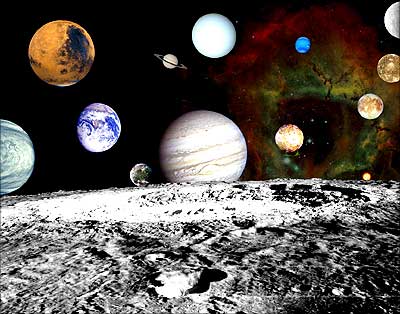 There is good news for scientists looking for a habitable planet to accommodate Earth's burgeoning population. According to a report in www.newscientist.com, many planets dismissed by astronomers as inhospitable may be reconsidered now as scientists realise that the pre-conditions for the existence of life may vary from planet to planet.
There is good news for scientists looking for a habitable planet to accommodate Earth's burgeoning population. According to a report in www.newscientist.com, many planets dismissed by astronomers as inhospitable may be reconsidered now as scientists realise that the pre-conditions for the existence of life may vary from planet to planet.
In a case of fact being stranger than fiction, scientists have discovered that water and life might exist in planets hitherto considered inhabitable. This one again throws open the age-old debate of whether aliens actually exist in the millions of planets in the universe, and if humans will be able to co-exist with them in conditions different from Earth.
Topping the wish-list of space scientists across the globe is the search for a planet that supports life, which has been going on for years.
Scientists have traditionally been looking for a plant in the 'Goldilocks zone' -- a plant at just the right distance from the sun, so that surface water remains liquid rather than being frozen solid or vapourising into gas, states the report.
But new findings have revealed that various other factors contribute in making a planet habitable. These include a planet's mass, atmosphere, composition and the way it orbits its nearest star, says the report. All or most of these factors together can keep surface water liquid, which gives rise to the speculation that there might be other forms of life out there in planets where the existence of life was not considered possible.
The findings have also forced scientists to consider the possibility of the existence of extraordinary forms of life in otherwise unlivable conditions. Independence Day-type aliens, swimming around in lakes of liquid chemicals in a frozen planet, may not be such a far-fetched scenario after all, scientists admit reluctantly in the report.
Photograph: NASA [Images]
 There is good news for scientists looking for a habitable planet to accommodate Earth's burgeoning population. According to a report in www.newscientist.com, many planets dismissed by astronomers as inhospitable may be reconsidered now as scientists realise that the pre-conditions for the existence of life may vary from planet to planet.
There is good news for scientists looking for a habitable planet to accommodate Earth's burgeoning population. According to a report in www.newscientist.com, many planets dismissed by astronomers as inhospitable may be reconsidered now as scientists realise that the pre-conditions for the existence of life may vary from planet to planet.